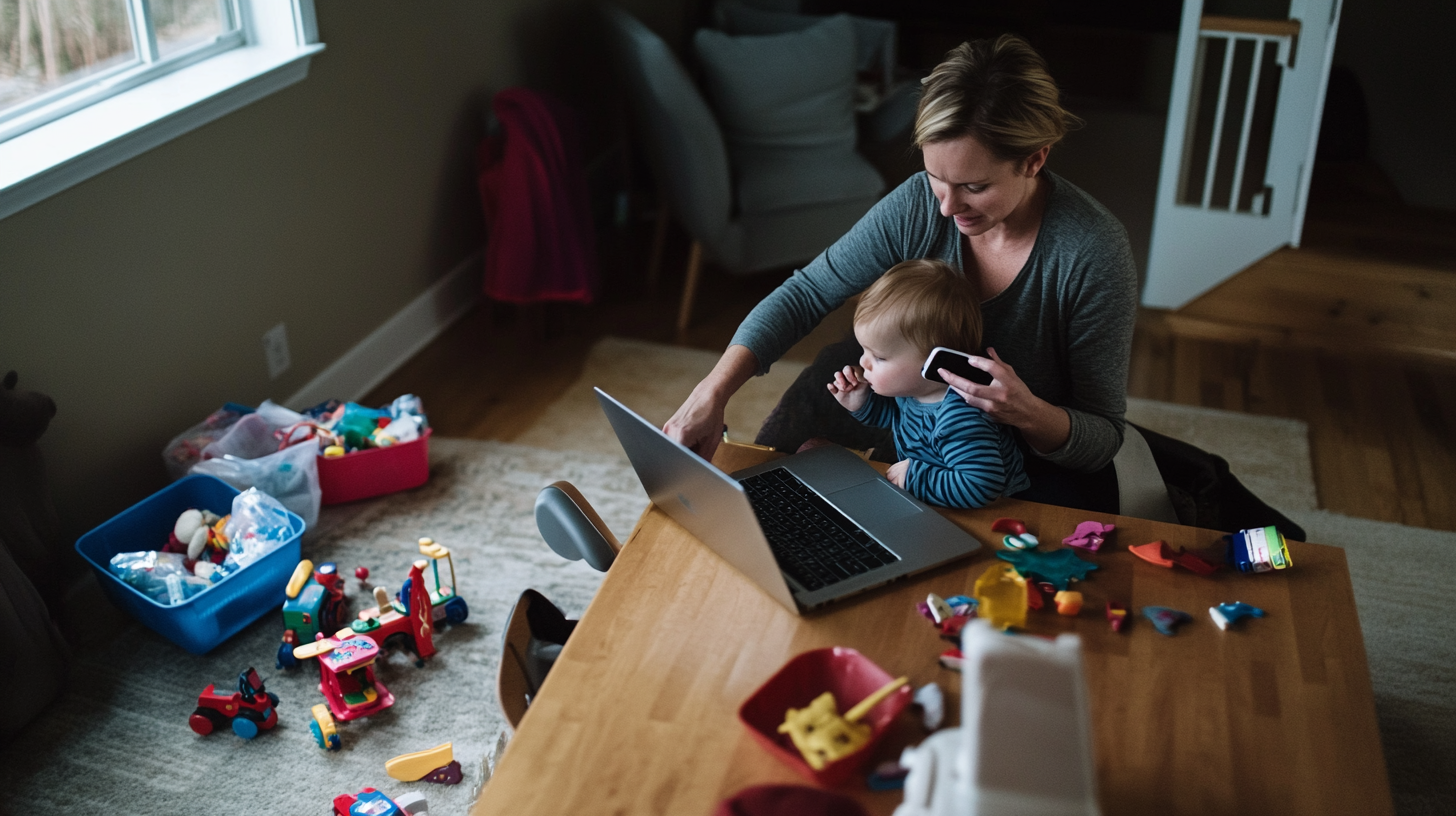Most mothers anticipate that raising children will come with stress. Sleepless nights, after-school chaos, and the emotional whirlwind of parenthood are often expected parts of the package. But what many don’t expect is this: for nearly half of mothers, their partner is actually a bigger source of stress than their children.
A Today survey of over 7,000 mothers found that 46% said their spouse or co-parent causes them more stress than their kids do. While that might raise a chuckle in some circles, the reality behind that number speaks to something more serious: many mothers feel unsupported, emotionally and practically, by the very person meant to share the load.
Modern mothers are carrying more than ever. Alongside their professional responsibilities, they’re managing schedules, school emails, groceries, emotional check-ins, and bedtime routines. They’re expected to perform as if they have no children at work, and parent as if they have no job at home.
This invisible balancing act—what psychologists call the mental load—can quietly wear down even the most resilient women. And when the burden isn’t shared equally, stress and resentment build.
So why is partner-induced stress so common—and often more draining than the stress of parenting itself? And more importantly, what can couples do to rebalance the emotional and practical scales?
Let’s take a closer look at what the research reveals, what mothers are saying, and what experts recommend to lighten the load.
1. Why Partners Cause More Stress Than Kids
Children are expected to be demanding. They cry, make messes, interrupt meetings, and test limits—often all before breakfast. But their needs are typically seen as part of the parenting journey. The stress they bring, while intense, is understood and anticipated.
The stress that comes from a partner, however, is different. It’s often unspoken, lingering, and emotionally complex.
In a Today survey of over 7,000 mothers, participants rated their average daily stress level at 8.5 out of 10, with nearly half saying their partner was a bigger source of stress than their children. The reasons behind this aren’t always rooted in major conflict. Instead, they tend to accumulate slowly—through repeated oversights, unequal division of labor, and the unspoken assumption that one person will naturally take charge.Therapist Georgina Sturmer describes this pattern as a kind of invisible pressure. Small, unresolved tensions about parenting approaches, chores, money, or emotional support can create a low-level friction that’s hard to name, but easy to feel. “Instead of finding our co-parent supportive,” she notes, “we can actually feel as if they are simply adding an extra weight to our lives.”
Part of the problem lies in perception. Research shows that many fathers believe they are contributing equally at home. But time-use data often reveals otherwise—women continue to shoulder a disproportionate share of domestic and caregiving responsibilities, even in dual-income households. This gap between intent and reality can leave mothers feeling invisible, unacknowledged, or emotionally alone in the work of family life.
And while the chaos of parenting—tantrums, bedtime battles, and all—is undeniably exhausting, it comes with context. Most parents understand that young children are dependent and still learning. The stress that stems from a partner, on the other hand, often feels more personal—a reflection of imbalance, unmet expectations, or emotional disconnect.
The good news? It doesn’t have to stay this way. In the next section, we’ll look at what actually helps lower maternal stress—and why some forms of father involvement are more effective than others.
2. The Role of Father Involvement and Co-parenting

When a partner is actively involved in parenting and household responsibilities, the difference can be profound. But research shows it’s not just about doing more tasks—it’s about how those responsibilities are shared, and whether they’re approached as a true partnership.
A growing body of studies highlights that father involvement can ease maternal stress, particularly when paired with positive, cooperative coparenting. This doesn’t mean just playing with the kids or helping out occasionally. The most meaningful impact comes when fathers take part in daily caregiving routines—things like feeding, bathing, school prep, and making decisions about the child’s wellbeing.A study of working mothers in Portugal revealed that when fathers participated consistently in these caregiving roles, mothers reported greater satisfaction and less stress. But there was a catch: this effect only held when the couple worked together as a team.
This is the heart of coparenting—not just dividing tasks, but supporting one another emotionally, communicating clearly, and sharing parenting goals. When coparenting is strong and cooperative, the load feels lighter. But when it’s conflictual—marked by disagreements, criticism, or lack of trust—it can actually make stress worse, even if the partner is technically “helping.”
For mothers, it’s not just about whether their partner participates—it’s how they participate. Is the partner proactive or passive? Do they follow through consistently, or wait to be asked? Are decisions made together, or left to one parent by default?
When caregiving and household management are treated as a shared responsibility—not an occasional favor—maternal stress drops, and relationship satisfaction rises. It’s less about tallying tasks and more about feeling supported, seen, and respected.
And that’s a shift that benefits not just mothers—but the entire family.
3. What Helps—And What Needs to Change
Recognizing that partners can be a major source of maternal stress isn’t about pointing fingers—it’s about creating space for real change. Fortunately, research and expert insight point to a few clear, actionable strategies that can make a meaningful difference.
First, communication matters more than we think. Many mothers avoid bringing up their frustrations for fear of creating conflict. But according to therapist Georgina Sturmer, when we suppress resentment, it tends to leak out in unproductive ways—through silence, sarcasm, or short tempers. Instead, she encourages couples to talk openly, using calm, respectful language. Starting with “I feel…” instead of “You never…” can open the door to more constructive conversations.
Second, it’s time to move past the idea of “helping”. When one partner is always the manager and the other the assistant, the imbalance—and stress—remains. Real progress happens when both partners take full ownership of caregiving and household tasks, without needing to be reminded or directed.
Reimagining roles also means challenging old narratives. Many women have internalized the belief that they must juggle everything flawlessly—career, home, parenting—with little room for rest or error. But in healthy, equitable partnerships, both people make space for one another’s needs, time, and emotional well-being.
Finally, support doesn’t need to come only from within the relationship. Extended family, trusted friends, therapists, or parenting groups can all play a vital role in easing the emotional weight of modern parenthood. Sometimes just knowing you’re not alone can ease the mental burden.
Stress in parenting is inevitable—but stress from imbalance doesn’t have to be. With shared effort, honest conversations, and a commitment to mutual support, couples can shift from feeling overwhelmed to feeling like a team again.
4. Why This Matters: The Ripple Effect of Maternal Stress

When mothers feel unsupported, it doesn’t stay contained—it ripples through the entire household. Research consistently links maternal stress to a wide range of outcomes, including increased tension in the home, lower relationship satisfaction, and even challenges in child development.
But the opposite is also true. When mothers feel supported—emotionally, mentally, and practically—the benefits are broad and lasting. Studies show that equitable parenting is linked to stronger co-parenting bonds, better communication, and more emotionally resilient children.
The takeaway? This isn’t just about chores or calendars—it’s about well-being. When we talk about reducing maternal stress, we’re really talking about creating families where both partners thrive, and children grow up witnessing healthy, respectful models of shared responsibility.
Shifting these dynamics doesn’t require dramatic overhauls. It starts with awareness, followed by small, intentional changes in how we communicate, how we listen, and how we show up for each other.
Rebalancing the Emotional Scales
Parenting is demanding by nature—but for many women, the greater weight isn’t in the childcare itself, but in the imbalance of emotional and household labor. When one partner quietly becomes the project manager of family life, the result isn’t just exhaustion—it’s a slow erosion of support, trust, and connection.
But this stress dynamic is not inevitable. The research is clear: when partners share responsibilities in a genuine, thoughtful way—and when both engage not just physically but emotionally—maternal stress decreases, communication improves, and relationships grow stronger.
Support isn’t about perfection or rigid equality. It’s about presence. It’s about noticing, engaging, and showing up consistently—not just for the kids, but for each other.
As couples begin to talk more openly, divide tasks more equitably, and redefine what it means to be a team, the mental load begins to lift. And when that happens, everyone benefits—especially the mothers who have carried so much, for so long, without always being seen

